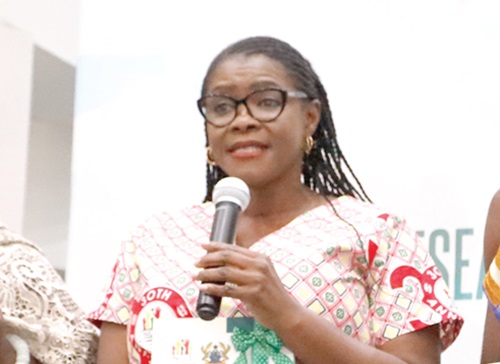Majority of voters believe that vote-buying can influence election outcomes, a survey by the National Commission for Civic Education (NCCE) has shown.
In the survey, 64.3 per cent agreed that vote-buying had influence on election outcomes, with 25.5 per cent saying “no”, and a further 10.2 per cent answering “not sure”.
Generally, respondents knew what vote-buying was, as a majority of them indicated that it involved offering money or goods in exchange for votes.
The study, dubbed: “Matters of Concern (MoC) to the Ghanaian Voter”, was conducted in August 2024, with a total of 9,324 respondents participating from across the 16 regions and the 275 constituencies with representation in the current Parliament.
Launch
It was launched by the Chairperson of the NCCE, Kathleen Addy, in Accra last Wednesday.
Data was collected between August 12 and 28, 2024, concurrently in all the 276 constituencies.
The overall outcome of the survey identified education, roads and infrastructure, employment, health and the economy as the top five issues of voters ahead of the December 7 elections this year.
On confidence that the elections would be free of vote buying, 10.1 per cent was very confident, 15.7 per cent somewhat confident, 20.7 per cent neutral, 25.6 per cent not very confident and 27.9 per cent not confident at all.
Presidential candidates
Again, 83.4 per cent of the voters said a candidate’s policies and promises would influence their choice of presidential candidate as against 16.6 per cent who disagreed.
Moreover, the survey showed that a candidate’s track record and experience would influence their choice of presidential candidate.
On whether monetary inducement could be a factor influencing the choice of a presidential candidate, 87.8 per cent said “no”, while 12.2 per cent “yes”.
On whether a candidate’s choice of running mate would be a factor, 76.8 per cent responded in the negative, with 23.2 per cent saying “yes”.
On religious affiliation of candidates, 89.5 per cent said it did not matter, while 10.5 per cent said it was relevant.
Regarding the ethnicity of candidates, 89.9 per cent indicated it would be of no consequence, with 10.1 per cent saying it would.
On a candidate’s track record and experience, 83.3 per cent of the respondents said it was important, with 16.7 per cent saying it was not.
Parliamentary candidates
Regarding the factors influencing the choice of a parliamentary candidate, 90.2 per cent said “no” to the religious affiliation of a candidate, with 9.8 per cent saying it would influence them.
A total of 90.1 per cent of the voters rejected ethnicity, with 9.9 per cent yielding to ethnic consideration.
On whether monetary inducement would influence the choice of a parliamentary candidate, 88.0 per cent kicked against it, with 12.0 per cent agreeing.
A parliamentary candidate’s track record and experience recorded 82.8 per cent “yes” for those who believed it would affect their choice, with 17.2 per cent saying it would not, while 83.7 per cent said a candidate’s policies and promises would affect their choices, with 16.3 per cent saying it would not.
On the issue of trust in the Electoral Commission among respondents, 42.1 per cent indicated “yes”, while 15.3 per cent said “no”, with 42.6 per cent ticking “not sure”.
On the confidence in the electoral system by region, the North East Region topped with 55.6 per cent, followed by the Eastern Region with 53.5 per cent, and Ashanti Region on 51.5 per cent.
The Western Region showed 48.6 per cent trust for the electoral system; Central Region had 46.6 per cent trust for the electoral system; Ahafo Region showed 45.7 per cent trust for the electoral system; Western North had 39.9 per cent for the electoral system, while Oti Region had 39.2 per cent trust for the electoral system.
Others
The rest are Bono Region with 37.3 per cent trust for the system; Greater Accra with 36.4 per cent trust for the system; Upper West with 36.2 per cent trust for the system; Northern Region had 33.4 per cent trust for the system; Savannah Region had 30.8 per cent trust for the system; Upper East showed 28.5 per cent trust for the system, while Volta Region showed 26.4 per cent trust for the system.
Since 2004, the NCCE has conducted research on Matters of Concern to the Ghanaian Voter, providing valuable insights into the primary needs of Ghanaian citizens.
The study sheds light on issues that matter most to voters, contributing to a more inclusive democratic process.
Making its sixth edition since 2004, the 2024 Matters of Concern to the Ghanaian Voter explored citizens’ perspectives on the country’s electoral process and what citizens demand from their political representatives.

